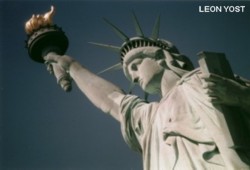 |  |  |
|
| ||
 |  |  |
 |  |  |
|
| ||
 |  |  |
|
|
Originally appeared in the New York Times on Sunday, March 25, 2001
By DAN BARRY
A failed land deal and a questionable $225,000 payment haunt the acting governor. The fund- raising practices of a United States senator have generated a widening federal investigation. A former attorney general, now a State Supreme Court justice, is the focus of explosive hearings on whether the state covered up evidence of racial profiling.
New Jersey? How did you guess?
In Paterson, the city engineer admits to accepting a paid trip to Disney World from a local construction company whose president admits to bribing a higher city official yet to be named. In Bergen County, the sheriff pleads guilty to handing out "honorary special deputy" badges in exchange for campaign contributions, and now the state wants those authentic-looking badges rounded up.
There's more. The mayor of Camden is convicted of being the mob's City Hall liaison, while the police chief of West New York, N.J., admits that after taking an oath to protect and serve, he protected and served prostitution and gambling rings. And in Passaic County, a court-appointed monitor is deemed necessary to preserve the basic right to vote.
The cases vary widely in content and gravity; the continuing investigations may ultimately find nothing illegal or unethical. And political scientists, government watchdogs and former prosecutors are divided on whether the current crop of allegations constitutes anything heavier than mere coincidence. Even so, New Jersey seems awash in a flood of scandal and investigation these days, evoking the bad old days when the state's very name was synonymous with corrupt politics. It's like a trip down crooked memory lane.
"You can understand why the public would think that New Jersey's longstanding reputation for corruption is continuing, if not getting worse," said Donald Linky, president of the nonpartisan Public Affairs Research Institute of New Jersey, in Princeton.
Taken together, though, the cases do not reflect a simple resurgence of old-style corruption as much as a bewildering intersection of the old and new: the familiar brass knuckles style of politics and the traditional embrace of local independence, blending with ballooning communities, ever-expanding developments and top-dollar political campaigns.
"Jersey is a state in a perpetual state of demographic change: the process of never-ending suburbanization," said David Rebovich, a political scientist at Rider University in Lawrenceville, N.J. "And that has brought a lot of public expenditures, a lot of public contracts, a lot of opportunities for the public sector and a lot of temptations for public officials.
"Those are the situations where public officials find themselves working hand in hand with business interests, where it's so easy to cross the line and come back again."
Public officials are quick to reject any suggestion that New Jersey's problems with corruption are unique, a notion that Acting Gov. Donald T. DiFrancesco says "just feeds the unfair stereotypes about our state that are perpetuated by the media and others."
"In any profession, whether it is politics, sports or business, there is the occasional bad apple," he said in a statement. "But these circumstances should not overshadow the dedicated work of thousands of public servants."
Ed Stier, a former federal prosecutor and the former director of the State Division of Criminal Justice, said the state's reputation for being corrupt was rooted in hard, cold history. And, he said, "The state's capacity to deal with organized crime and corruption, particularly corruption, has diminished over time."
For many years, graft was seen in some New Jersey quarters as a perk, not a crime; public corruption was just another name for a pension plan. Harold G. Hoffman, the governor in the mid-1930's, was an embezzler in the clutches of a blackmailer. Frank Hague, the longtime boss of Jersey City politics, managed to maintain several homes, including one in Palm Beach, Fla., on a mayoral salary of no more than $9,000 a year. When he died in 1956, he left an estate worth more than $5 million.
A confluence of developments in the late 1960's, though, exposed the New Jersey way.
William G. Brennan, a well-known state prosecutor at the time, told a luncheon gathering of journalists that many local governments "are more responsive to the mob than to the electorate that put them in office." A state commission investigating the Newark riots of 1967 concluded that many of the city's black residents felt no allegiance to a local government corrupt to its core. And a zealous crowd of state and federal prosecutors succeeded in convicting dozens of corrupt mobsters, union bosses and public officials, including Hugh J. Addonizio, the mayor of Newark and a former congressman.
Responding to the public outcry, the state passed laws and dedicated resources to crack down on corruption, to the point that, according to Mr. Stier and others, New Jersey became a national model. "Dramatic changes occurred in the culture of the state," Mr. Stier said. "It was no longer acceptable to engage in corrupt conduct."
But Robert J. Del Tufo, a former state attorney general, said the government's success in combating corruption, coupled with the breathless news reports, wound up feeding, rather than dousing, the perception of New Jersey as ethically challenged.
"I don't think that New Jersey has any more or any less corruption than anyplace else," he said. "I just think that law enforcement has been more effective."
Others agree that the media have fostered the impression that every foot of Garden State Parkway asphalt has its hidden cost, and that every public official's backyard pool is a gift for services rendered. "It makes a good story," said Gerald M. Pomper, a professor of political science at Rutgers University. "Some of it is people looking for what they expect to find. They focus on it and exaggerate it."
The media have had help, beyond such scandals as the Abscam investigation two decades ago that ensnared a sitting New Jersey senator, Harrison A. Williams Jr. Several politicians, including former Gov. Brendan Byrne, ran campaigns intended to set themselves apart from institutional corruption. In 1992, the State Commission on Investigation issued a report stating that public corruption "continues to fester in manifold forms and places." It gave several examples of how corrupt practices had resumed in communities several years after they had been exposed.
James W. Hughes, dean of the Edward J. Bloustein School of Planning and Public Policy at Rutgers, said he doubted that New Jersey was fundamentally different from any other state, but he said its reputation for corruption might be rooted in its very nature. The state has the highest population density in the country, more than 1,300 people per square mile, he said. It also has "more government per capita than any other state," more than 560 municipalities, more than 600 school districts, 21 counties and one immense state government.
"Maybe there are more things that can go wrong," he said.
Former Governor Byrne offered another explanation: the cost of political campaigns has gone up significantly, a development that plays out with particular force in New Jersey, where neither party has achieved dominance and the lack of a local television outlet has made campaigning extraordinarily expensive.
"You're not going to get contributions just from people interested in good government," he said. "It's degrading to have a candidate pick up the phone and plead for money. Then the guy comes down and he wants something. I never really had that."
Mr. Byrne was among the many to argue that New Jersey is more vigilant than most states about wrongdoing. But he was also among the many to agree that the ongoing matters of today seem, if nothing else, plentiful.
At the top of the pile are the past real estate endeavors of Mr. DiFrancesco and his relatives, including the recent revelation that in 1996 he received $225,000 from the state's largest home builder to settle an outstanding legal judgment. He has vehemently denied any wrongdoing, but the matter has damaged his regular-guy persona at a time when he is campaigning for the gubernatorial election in November.
"He didn't do anything illegal," said Curtis Fisher, the executive director of the New Jersey Public Interest Research Group. "But it doesn't look very good getting favors for your family through your position of authority."
Meanwhile, federal prosecutors are investigating allegations of illegal contributions and obstruction of justice within the 1996 campaign of Senator Robert G. Torricelli, who has said that he abided by all campaign finance laws. Six campaign donors have pleaded guilty to making illegal contributions, and three of Mr. Torricelli's former campaign staff members have been notified that they may be prosecuted.
A third, much different case is that of Peter G. Verniero, the former attorney general and now an associate justice of the State Supreme Court. In politically charged public hearings that began last week, a legislative committee is focusing on whether Mr. Verniero withheld from the Justice Department certain data regarding the racial-profiling practices of the state police. It is also questioning whether, during hearings on his nomination to the court in 1999, he misrepresented when he first learned of the practice.
Justice Verniero's lawyer, Robert A. Mintz, said judicial rules prevented his client from commenting. But Mr. Mintz said that in his own opinion, the current cases involving ethical or criminal matters "are completely unrelated."
"I think people are pretty sophisticated and are able to view each of these incidents on their individual merits," he said.
Jon J. Shure, the president of New Jersey Policy Perspective, a liberal research organization in Trenton, agreed. "I'm not sure the whole is greater than the sum of the parts," he said.
But Mr. Stier, the former federal prosecutor who spent much of his career combating corruption, indicated little patience for those who do not recognize recent signs that more vigilance is needed. Yes, he said, other states, including Pennsylvania, Louisiana and Rhode Island, have similar reputations. And yes, New Jersey responded, better, in fact, than did most other states.
"But you can't deny that New Jersey has had big-league organized crime and corruption problems," he said. "People shouldn't be denying that."
Mr. Rebovich of Rider University agreed. He mentioned that he grew up near South Amboy, where Hoffman High School still bears the name of a corrupt former governor.
"Only in Jersey," he said.
 Your Ancestors' Story |
 Bruce Springsteen's Jersey Shore Rock Haven! |

|
UrbanTimes.com |